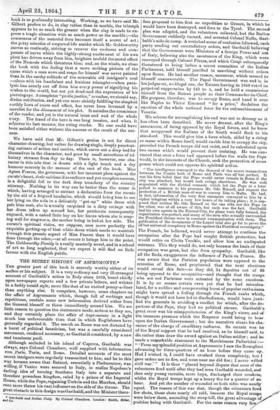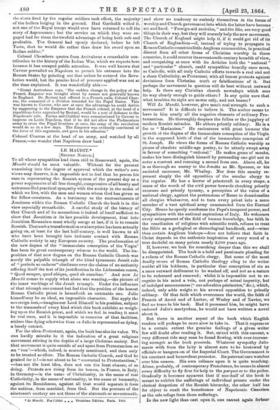THE SECRET HISTORY OF ASPROMONTE.* THE greater part of this
book is scarcely worthy either of its author or his subject. It is a very ordinary and very ill-arranged account of Garibaldi's action in Italy since 1859, based chiefly upon newspaper reports and a few private"letters, and written in a feebly tumid style, more like that of an excited penny-a-liner than anything else. It comprises, however, some chapters on the affair of Aspromonte which, though full of verbiage and repetitions, contain some new information derived either from the General himself or those immediately around him. We see little reason to question the statements made, serious as they are, and they certainly place the affair of Aspromonte in a light much less unfavourable than that in which Englishmen have generally regarded it. The march on Rome was not dictated by a burst of political fanaticism, but was a carefully considered movement, rendered necessary, as Garibaldi considered, by a new and imminent peril.
Although secluded in his island of Caprera, Garibaldi was always, says Colonel Chambers, well supplied with information rom Paris, Turin, and Rome. Detailed accounts of the most secret intrigues were regularly trausmitted to him, and he in this way became aware that Ratazzi, essentially a Piedmoutese, was willing, if Venice were secured to Italy, to realize Napoleon's darling idea of turning Southern Italy into a separate and therefore powerless kingdom, ruled by a prince of the Imperial House, while the Pope, regaining Umbria and the Marches, should once more throw his vast influence on the side of the throne. The great obstacle to this design was Garibaldi, and the Minister there-
• Garibaldi and Italian Unity. By Colonel Chambers. London: Smith, Bider, and Co.
fore proposed to him first an expedition to Greece, in which he would have been destroyed, and then to the Tyrol. The second plan was adopted, and the volunteers collected, but the Italian Government suddenly turned, and arrested Colonel Nullo, Gari-
baldi's aide-de-camp. A wretched scene of confusion followed, each party sending out contradictory orders, and Garibaldi believing that the Government were Ministers of a foreign Power and not
of Italy, believing also the assurances of the King, which were conveyed through Colonel Plezza, and which Crispi subsequently threatened to bring before a secret committee of the Italian Parliament, held himself justified in marching without orders upon Rome. He had another reason, moreover, which seemed to himself unanswerable. The Papal Government was and is, in his judgment, an illegal one, the Estates having in 1848 voted its perpetual suppression by 143 to 5, and he held a commission
himself from the Roman people as their Commander-in-Chief. His purpose, therefore, was to occupy Rome, and hand it over
like Naples to Victor Emanuel " for a price," doubtless the exertion of the whole national force for the enfranchisement of Venetia.
His scheme for accomplishing his end was not so dreamy as it has often been described. He never dreamt, after the King's assurances, of being opposed by the Royal forces, and he knew that unopposed the Italians of the South would flock to his
standard. This would give him a force which, aided by a rising en masse within Rome itself, would enable him to occupy the city, provided the French troops did not resist, and he calculated upon two causes which would prevent their resisting. He was con- vinced that once a force had appeared before the walls the Pope would, in the interests of the Church, seek the protection of some power which could not oppress his spiritual action.
"The intelligence conveyed to the General of the secret transactions between the Courts both of Rome and Paris was all but perfect. It was his firm belief that the Pope would never remain in Rome if the city was attacked, but would seek refuge elsewhere. He was well acquainted with the divided counsels which led the Pope at a later period to summon to his presence Mr. Ode Russell, and request the protection of a British man-of-war to convey him to Malta. He had, in fact, information of the very first summons conveyed to him by a cipher telegram within a very few hours of its taking place ; it is sup- posed that neither Mr. Odo Russell on the one side, nor the Pope on the other, was at all aware of this, but such was the fact. Garibaldi had his own agents in the Eternal City, his plans were fully formed, the organization was perfect, and many of the men who actually surrounded the Pontifical throne were in constant communication with them. The publication of the documents of the Lansti trial also go far to prove the all but universal conspiracy in Rome against the Pontifical sovereignty."
The French, he believed, would never attempt to continue the occupation after the Pope had sought British protection, but would retire on Civita Vecchia, and allow him an undisputed
entrance. This they would do, not only because the basis of their occupation was gone, but also from sympathy. Garibaldi, like all the Reds, exaggerates the influence of Paris on France. He was aware that the Parisian population were opposed to the retention of Rome, and prophesied that the next elections would reveal this fact—as they did, 34 deputies out of 36 being opposed to the occupation—and thought that the troops who are not Parisians were actuated by the same emotions. It is by uo means certain even yet that he had miscalcu- lated, for a sudden and overpowering burst of popular enthusiasm might have spread a feeling through the French ranks which,
though it would not have led to disobedience, would have justi- fied the generals in avoiding a conflict for which, after the de- parture of the Pope, they had no political excuse. Garibaldi's great error was his misapprehension of the King's views, and of the immense pressure which the Emperor could bring to bear upon the Italian Government ; but the narrative clears his cha- racter of the charge of unmilitary rashness. So certain was be of the Royal support that he had resolved, as he himself said, to die rather than draw the sword against an Italian soldier ; and he made a remarkable statement to the Marchioness Pallavicini :— " ' From my splendid position at Aspromonte I saw the Bersaglieri advancing for three-quarters of an hour before they came up. Had I wished it, I could have crushed them completely, but I gave orders not to fire, and none near me did fire ; I never willed civil war.' " It is thus "placed beyond dispute that none of the
volunteers fired until after they had seen Garibaldi wounded, and then only young recruits, mere boys, discharged their muskets, whilst the Royal troops kept up a heavy firs for a quarter of an hour. And yet the number of wounded on both sides was nearly equal. The reason of this was that, though the volunteers fired few shots, those shots nearly all told, because the Royal troops were below them, ascending the steep hill, the great advantage of / position being with Garibaldi. For the same reason very few
the shots fired by the regular soldiers took effect, the majority+ of the bullets lodging in the ground. Had Garibaldi willed it, not one of the Royal troops would ever have returned to tell the story of Aspromoute ; but the service on which they were en- gaged had for them the twofold advantage of being both safe and profitable. The General had openly declared, before he left Turin, that he would die rather than draw his sword upon an Italian soldier."
Colonel Chambers quotes from Arrivabene a remarkable con- tribution to the history of the Italian War, which we requote here because it has escaped public attention. It was well known that Cavour prevailed on Napoleon to permit his entrance into the Roman States by pointing out that unless he entered the Revo- lution would, but the precise kind of pressure applied was not at the time explained. It was wonderfully able :-
"Count Arrivabene says, The sudden change in the policy of the French Emperor was brought about by causes not generally known in England. Dr. Bertani had offered to a French exile, Colonel Char- ras, the command of a division intended for the Papal States. This was known to Cavour, who saw at once the advantage he could derive by suggesting to the Emperor that the French colonel, at the head of a republican force organized by Bertani, would be a sort of defiance to the Napoleonic rule. Farina and Cialdini were commissioned by Cavour to impress on Louis Napoleon, that if he did not allow the Piedmontese army to cross the Papal frontiers at once, the army of the revolution would do so in a few days. The Emperor was evidently convinced of the force of this argument, and gave in his adhesion."
Colonel Charras at the head of an army, and watched by all France,—no wonder that Napoleon drew back !































 Previous page
Previous page